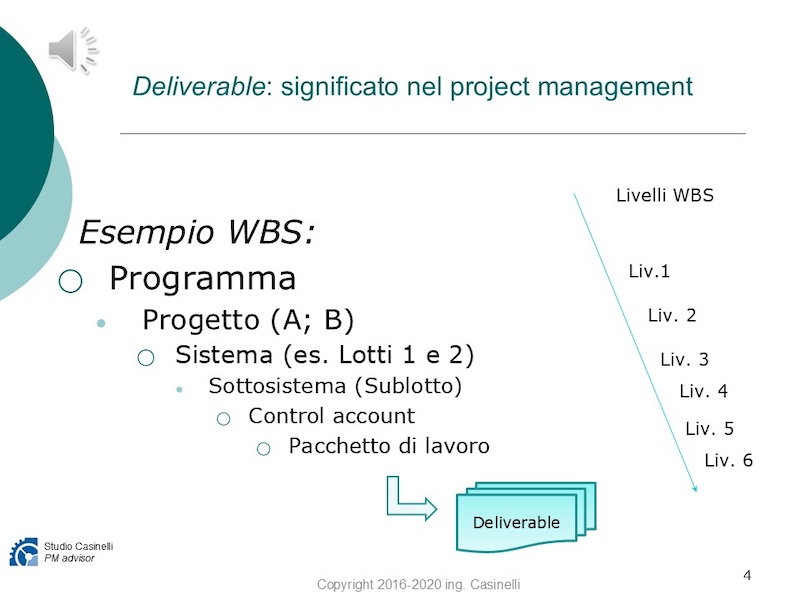Views: 309
Inside the concept of deliverable
In the Scope Management process, the most critical aspect concerns theidentification of the deliverable and the definition of precise criteria for their approval. This article concerns in particular the definition of their concept.
Cosa significa deliverable in project management? The literal translation is "expected result" or "delivery product", but there is no ending in Italian that fully expresses its meaning.
In general, The expression is used to identify products delivery during the execution of the project. These are therefore tangible products, measurable and specific, released(delivered) during the course of the project: From this follows the intuitive correlation between deliverable and measure of physical advancement (progress) of the activity.
A (o o) deliverable is usually made up of a package of documents: drawings, technical specifications or finished products, like a prototype, a mathematical model, the result of a geological or market survey, the completion of a preliminary design, the arrival of complex equipment on site, such as the launching equipment for the beams, ecc.

Ideally, theDELIVERABLE PROJECT should already be identified in the planning phase. In very structured contexts, The complete list of these factors is one of the priority deliveries to be performed, often associated with the release of one of the first payment installments.
Their identification is carried out during the phase of analysis and definition of the purpose of the work (Scope Management). In general, this implies a formal issue and delivery (submittal) to the client; In more complex cases, delivery can be made for intermediate steps and followed by a workshop.
Acquire fundamental skills
In the management of projects!
Basically, the Management of a deliverable it should always be a formalized process, default, what a rule – contractually – the submission to the customer, any reviews and additions, and final acceptance.
Some/and deliverable can be associated with Milestone intermediate, che definiscono una road-map calendarizzata dell’esecuzione del progetto, identifying significant intermediate steps or results; ciò contribuisce a mitigare il rischio dei ritardi. Failure to achieve these Milestone can lead to criminal, making the inclusion of all the Milestone in the project program fundamental.
In summary, il concept of deliverable is associated with some important elements:
- Definition of the purpose (scope) of work;
- Acceptance criteria of deliverals that require a well -defined submission process, Revision and approval;
- Intermediate milestone with any penalties that are included in the program(the piano) of Project;
- Mechanism of measurement of the progress of the project(project progress), which can be based on the conventional weight of the deliverable.





